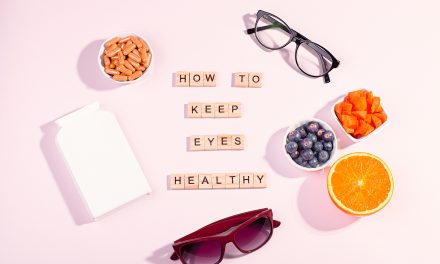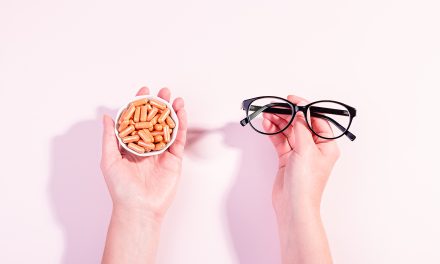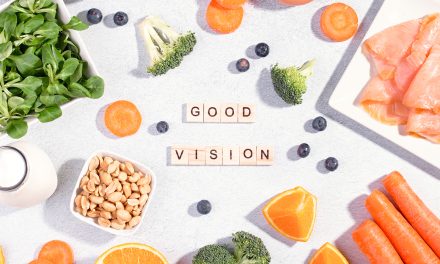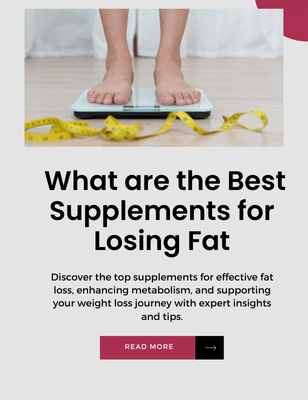Maintaining healthy eyes is crucial for overall well-being and quality of life. Good vision contributes to performance in work, safety in daily activities, and enjoyment of visual experiences. As such, there is a growing interest in nutritional supplements that support eye health. The connection between nutrition and eye health is supported by scientific research, which suggests that certain vitamins and minerals may help preserve vision and prevent eye diseases.

Specific nutrients, including vitamins A, C, and E, have been shown to play a key role in eye health. These essential vitamins, along with minerals such as zinc and selenium, contribute to the protection of the eyes from oxidative stress and inflammation, which can lead to degenerative conditions over time. Omega-3 fatty acids, found in fish oil supplements, are also believed to support retina health and may provide benefits for those with dry eye conditions.
In addition to these supplements, antioxidants like lutein and zeaxanthin are known to filter harmful blue light and are central to maintaining the structural integrity of the retina. While supplements can play a part in preserving eye health, it is also important to obtain these nutrients from a balanced diet rich in fruits, vegetables, and omega-3-rich fish. As with any supplement regimen, it is essential to consider safety and efficacy, and seek advice from healthcare professionals before starting any new supplement.
Key Takeaways
- Specific vitamins, minerals, and omega-3 fatty acids are linked to improved eye health.
- Antioxidants like lutein and zeaxanthin protect eyes from harmful blue light and oxidative stress.
- A balanced diet along with professional advice is important when considering eye health supplements.
Importance of Eye Health and Nutrition
Maintaining healthy eyes is closely linked to proper nutrition; a balanced diet is essential for preventing various eye diseases.
Link Between Diet and Eye Health
A healthy diet provides antioxidants and nutrients critical for eye health. Lutein and zeaxanthin, for example, are found in green leafy vegetables and are vital for the retina. Omega-3 fatty acids, which are prevalent in fish, contribute to visual development and retinal function. Vitamin C, found in fruits and vegetables, and Vitamin E, found in nuts and seeds, help protect the eyes from damaging free radicals.
- Antioxidants: Prevent cellular damage in the eyes
- Lutein
- Zeaxanthin
- Vitamin C
- Vitamin E
- Omega-3 Fatty Acids: Support visual development and retinal health
Eye Diseases Related to Nutritional Deficiencies
Nutritional deficiencies can lead to several eye diseases. For instance, a lack of Vitamin A can cause xerophthalmia, a condition that can lead to blindness. Age-related macular degeneration (AMD) is associated with low levels of antioxidants and zinc.
| Nutrient | Eye Condition Associated |
|---|---|
| Vitamin A | Xerophthalmia, night blindness |
| Antioxidants | Age-related macular degeneration (AMD) |
| Zinc | AMD and poor night vision |
A balanced diet with sufficient vitamins and minerals is crucial to prevent these conditions.
Essential Vitamins for Eye Health
A selection of vitamins are key to maintaining eye health. These nutrients support various aspects of visual function and help protect the eye from damaging factors.
Vitamin A and Beta-Carotene
Vitamin A is crucial for good vision; it is a component of the protein rhodopsin, which allows the eye to see in low-light conditions. Deficiency in vitamin A can lead to night blindness and dry eyes. Sources include beef liver, carrots, and sweet potatoes. Beta-carotene is a precursor to vitamin A and contributes to the maintenance of healthy skin and mucus membranes, which are important for eye protection.
- Beef liver (3 oz): 444% Daily Value (DV)
- Carrot (1 medium): Over 100% DV
- Sweet potato (1 cup, baked): 204% DV
Vitamin C
Vitamin C is an antioxidant that the body uses to protect against oxidative stress, which can affect eye health over time. The human body does not produce vitamin C, so it must be obtained from fruits and vegetables. Adequate vitamin C intake may reduce the risk of developing cataracts and, when taken in combination with other essential nutrients, can slow the progression of age-related macular degeneration (AMD).
- Orange (1 medium): 89% DV
- Red pepper (½ cup, raw): 158% DV
- Kiwi (1 fruit): 71% DV
Vitamin E
Vitamin E works as an antioxidant that helps protect cells in the eyes from damage caused by free radicals. By helping to reduce oxidative stress, vitamin E plays a part in the prevention of cataracts and AMD. It is found in various nuts, seeds, and vegetables oils.
- Almonds (1 oz): 48% DV
- Sunflower seeds (1 oz): 37% DV
- Wheat germ oil (1 tablespoon): 100% DV
Important Minerals for Eye Support
Minerals are essential for maintaining eye health. They play significant roles in protecting the eyes from damage, aiding in the creation of essential enzymes, and ensuring proper visual function.
Zinc
Zinc is a vital mineral that is found in high concentrations in the eyes. It aids in the conversion of beta-carotene from carrots and other food sources into vitamin A, which is crucial for good vision. Zinc is also important for maintaining the health of the retina and may protect against macular degeneration and night blindness.
Food Sources of Zinc:
- Oysters
- Beef
- Pumpkin seeds
- Lentils
Selenium
Selenium is a powerful antioxidant that helps protect the eyes from oxidative stress and may reduce the risk of cataracts and macular degeneration. It supports the body’s production of glutathione peroxidase, an enzyme that helps maintain the integrity of the lens and the retina.
Foods High in Selenium:
- Brazil nuts
- Seafood
- Eggs
- Brown rice
Copper
Copper is an essential trace mineral that works together with zinc and helps enhance the protective benefits of antioxidants. It is involved in the formation of connective tissue in the eyes, supports healthy blood vessels, and reduces the risk of developing advanced age-related macular degeneration.
Copper-rich Foods Include:
- Shellfish
- Whole grains
- Nuts and seeds
- Organ meats
Omega-3 Fatty Acids
Omega-3 fatty acids are crucial for maintaining eye health, particularly in regard to the structural component of the retina and potential benefits for managing dry eye symptoms.
DHA and EPA
Docosahexaenoic acid (DHA) and Eicosapentaenoic acid (EPA) are the primary omega-3 fatty acids beneficial to eye health. They are found predominantly in fish oils and are integral to the development and maintenance of retinal health. DHA specifically is a major structural component of retinal cells where it plays a critical role.
- DHA: Essential for retinal health
- EPA: Supports eye health in conjunction with DHA
Benefits for Dry Eyes
People suffering from dry eyes may find relief by including omega-3 fatty acids in their diet. These nutrients help to:
- Improve the eye’s oil film: Produced by meibomian glands, this oil film is crucial for tear stability.
- Reduce eye inflammation: Omega-3s have anti-inflammatory properties that can help alleviate symptoms of dry eyes.
Omega-3 supplements, particularly those with a high concentration of DHA and EPA, have been shown to improve the function of the meibomian glands and reduce the symptoms of dry eye syndrome.
Antioxidants and Eye Protection
Antioxidants play a crucial role in defending the eyes from oxidative stress, which can cause age-related macular degeneration and cataracts. This section will explore specific antioxidants that are vital for eye health.
Lutein and Zeaxanthin
Lutein and zeaxanthin are carotenoids found in high concentrations within the macula, an area of the retina responsible for central vision. Their primary function is to filter harmful high-energy blue light rays, protecting the eyes’ delicate cells. Daily intake recommendations are:
- Lutein: 10 mg
- Zeaxanthin: 2 mg
Sources of these carotenoids include:
- Lutein: Kale, spinach, broccoli
- Zeaxanthin: Corn, saffron, eggs
Anthocyanins
Anthocyanins are known for their potent antioxidant and anti-inflammatory effects which help maintain the integrity of blood vessels in the eyes and can reduce the risk of retinal inflammation. They can be found in:
- Dark berries such as blueberries and blackberries (recommended intake: 100-200 mg/day)
- Grapes and red wine
- Bilberries (often standardized to 25% anthocyanins for supplements)
Herbal Supplements and Eye Health
Certain herbal supplements are believed to support eye health due to their antioxidant properties and beneficial plant compounds.
Bilberry
Bilberry, a relative of the blueberry, contains anthocyanins. These are potent antioxidants that can help improve night vision and maintain normal blood circulation in the retina.
Ginkgo Biloba
Ginkgo Biloba is reputed for its ability to enhance blood flow to various parts of the body, including the eyes. It is particularly noted for its potential in supporting the health of the macula and retinal tissues.
Supplement Safety and Efficacy
When considering supplements for eye health, consumers should understand the regulatory landscape and be aware of the potential for side effects and interactions.
Regulation of Supplements
Dietary supplements, unlike prescription medications, are not required to be approved by the Food and Drug Administration (FDA) before they are marketed. However, manufacturers are responsible for ensuring their products are safe and their label claims are truthful and not misleading. Once a product is on the market, the FDA monitors its safety and can take action against any supplement found to be unsafe or if fraudulent claims are being made.
Potential Side Effects and Interactions
Supplements can have side effects and may interact with other medications, leading to adverse outcomes. For example:
- Omega-3 Fatty Acids: Generally safe, but high doses may increase bleeding risk.
- Lutein and Zeaxanthin: Well tolerated, but may interact with blood thinners.
- Vitamin A: Excessive intake may cause toxicity, potentially leading to liver damage and central nervous system disorders.
- Zinc: Though essential in small amounts, high levels of zinc supplementation can lead to copper deficiency and neurological problems.
Consumers should consult a healthcare provider before beginning any supplement regimen, especially if they are pregnant, nursing, or taking other medications.
Dietary Sources for Healthy Eyes
To maintain healthy eyes through diet, certain vitamins and nutrients are essential.
Vitamins A, C, and E play a crucial role in eye health. Vitamin A is vital for good vision, particularly in low light conditions. It can be found in foods like:
- Carrots
- Sweet potatoes
- Spinach
Vitamin C contributes to the health of ocular blood vessels and can be found in:
- Citrus fruits (oranges, grapefruits)
- Strawberries
- Bell peppers
Vitamin E helps protect cells in the eyes from damage by free radicals. Dietary sources include:
- Almonds
- Sunflower seeds
- Avocados
Omega-3 fatty acids are important for retinal function and visual development. They can be found in fish such as:
- Salmon
- Trout
- Sardines
The mineral Zinc helps bring vitamin A from the liver to the retina. Foods high in zinc include:
- Oysters
- Beef
- Pumpkin seeds
For the carotenoids Lutein and Zeaxanthin, which are believed to help decrease the risk of chronic eye diseases, include these in your diet:
- Kale
- Peas
- Eggs
Incorporating these foods into one’s diet supports the overall health of the eyes. It’s beneficial to consume a colorful variety of fruits and vegetables to ensure a range of nutrients that contribute to maintaining healthy vision.
Lifestyle and Additional Advice
Maintaining healthy eyes extends beyond supplements; it also involves various lifestyle choices. Regular exercise and maintaining a healthy weight can reduce the risk of eye conditions such as age-related macular degeneration.
Diet:
A diet rich in fruits and vegetables—particularly leafy greens—provides essential nutrients for eye health. Omega-3 fatty acids, found in fish, contribute to visual development and retinal function.
Eye Protection:
Wearing sunglasses that block 100% of UV rays protects against cataracts and other eye problems.
Screen Time:
Minimizing exposure to digital screens can reduce eye strain. One should practice the 20-20-20 rule: every 20 minutes, look at something 20 feet away for at least 20 seconds.
Smoking:
Quitting smoking is imperative; it increases the risk of eye diseases, such as cataracts and macular degeneration.
| Habit | Benefit |
|---|---|
| Balanced diet | Provides essential nutrients |
| Regular exercise | Decreases risk of chronic diseases |
| Sunglasses | Protects against UV damage |
| Limited screen time | Reduces eye strain |
| No smoking | Lowers risk of eye diseases |
Regular check-ups with an eye care professional are crucial as they can detect problems early on. Proper sleep also plays a vital role in maintaining eye health. These practices complement the benefits of eye supplements for overall ocular health.
Frequently Asked Questions
This section addresses common inquiries regarding nutrients, vitamins, and foods beneficial for eye health and the role of supplements in maintaining and potentially improving vision.
What nutrients are essential for preventing macular degeneration?
The nutrients lutein and zeaxanthin are key to reducing the risk of macular degeneration. Omega-3 fatty acids, found in fish oil, also play a protective role against this condition.
How do antioxidant vitamins affect eye health?
Antioxidant vitamins, such as vitamin C and vitamin E, help protect the eyes from harmful free radicals. Regular intake can contribute to overall eye health and help prevent age-related ocular diseases.
Which fruits and foods are the best natural sources for eye health?
Citrus fruits rich in vitamin C, leafy greens packed with lutein and zeaxanthin, and fatty fish containing omega-3 fatty acids are among the best natural food sources for maintaining healthy eyes.
What is the efficacy of eye health supplements in improving vision?
While supplements containing vitamins C and E, zinc, lutein, zeaxanthin, and omega-3 fatty acids can support eye health, they are not a cure for existing vision problems. Their role is more preventive and supportive rather than restorative.
Can eye supplements help with floaters, and which ones are recommended?
Eye supplements may not specifically target floaters, which are usually harmless and often a result of aging. However, maintaining overall eye health with nutrients like vitamin C and omega-3 fatty acids may indirectly benefit the vitreous body of the eye.
Are there specific eye vitamins that can help to slow vision loss?
Vitamin A is crucial for preserving night vision and may slow the progression of vision loss in some disorders, while antioxidants like vitamins C and E can aid in protecting the eyes from oxidative stress, potentially slowing down the loss of vision.
Conclusion
In conclusion, the best supplements for healthy eyes, such as lutein, zeaxanthin, and omega-3 fatty acids, can help support vision and overall eye health. However, it’s important to consult a healthcare professional before adding these supplements to your routine, especially if you have existing eye conditions or are taking medications. When combined with a balanced diet rich in eye-friendly nutrients and regular eye care, these supplements may contribute to maintaining optimal vision and supporting long-term eye health.




















